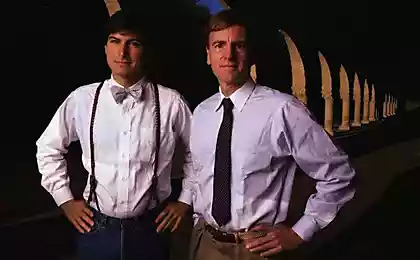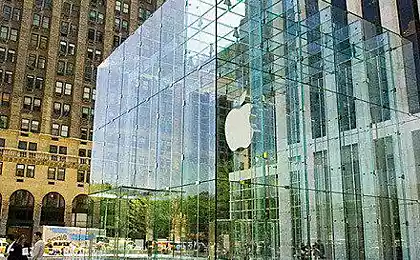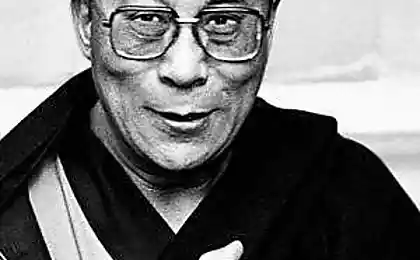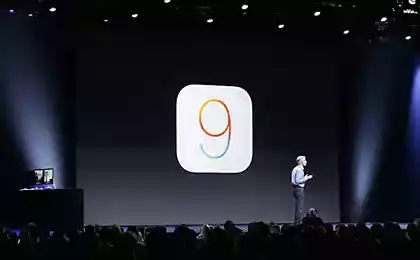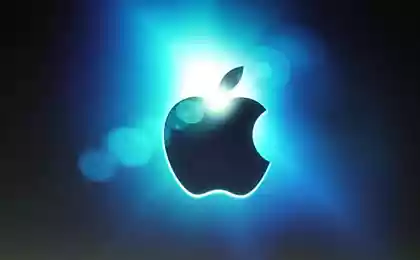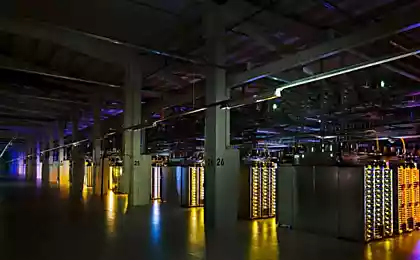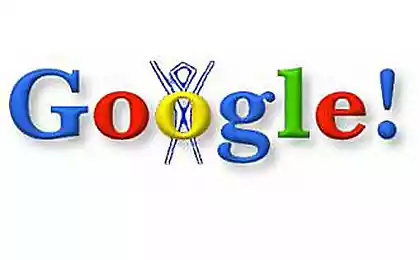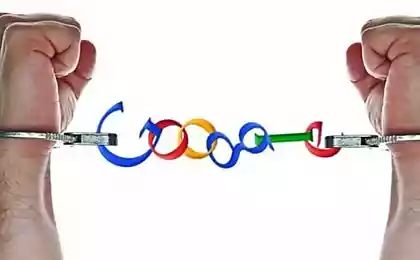490
The sociologist Harald Welzer: Google and Apple instead of Hitler and Stalin
The sociologist Harald Welzer about how our lives quietly penetrate a new form of totalitarianism.
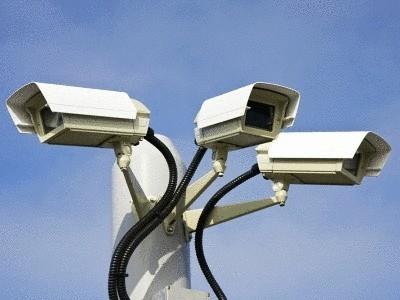
If you don't want something to become known, don't do it, warns the head of Google, Eric Schmidt, the Technological development leading to the control of the state or the all-powerful corporations over the private lives of citizens, is one of the favorite themes of Western fiction. However, recently this topic has become a worry not only writers and Directors, but also scientists. The sociologist Harald Welzer told "der Spiegel" about the extent to which a society can tolerate an invasion of the sphere of privacy, and when I should resist. Harald Welzer, sociologist. Dealt with the problem of human behavior under a totalitarian regime, in particular, the focus of his book, "My grandfather was not a Nazi" and "Criminals. As of perfectly normal people are mass murderers". Best-selling author he became for his writings about climate change ("Climate wars") and the meaning of abstinence in times of ecological threat ("Think for yourself. A guide to resistance"). He has just completed work on a book of "Autonomy. Strategy defense", in which first examines the impact on society of digital concerns. The book will be released in April. Mr. Welzer, Apple's smartphone always knows where we are, Uber knows where we're going. The Samsung TV is recording our conversations in the living room. Google knows that tomorrow we will want to buy. And users all are happy about that. You too?
— Not at all. I believe that we are on the path to a new totalitarianism. We always think that this requires a visible change in the system of government, with the shape and army boots. As it was under national socialism in Germany or under Stalin. It is familiar to us in the twentieth century, but perhaps in the twenty-first century, the scenario will be different.
— You really want to compare Google and Apple with Hitler and Stalin?
— No, I'm talking just about creeping, non-violent change of the forms of domination. So far we have encountered only these forms of regime change that were associated with the change of faces, with some new iconography of power. I am worried about the question: is it possible to imagine that the external organization will remain the same, while the internal balance of power will change?

Photo: WERNER SCHUERING / DER SPIEGEL — You studied totalitarianism time of national socialism in Germany and Stalinism in the USSR. Why do you say the threat of a new totalitarian system?
Dictatorships are always primarily working on the abolition of private, secret and hidden. Because the only way to effectively control people. Google and his comrades are working on the abolition of private. And today they control more than just the Internet. They increasingly control our social life. They set the rules, they decide what is good for us, what is bad, what should be the human life, how can we coexist with each other. Google dominates us, capturing the native personal sphere. Is the threat of totalitarianism without form.
Google craves not power, but profit. The group wants to do business on user data.
— And you believe it? His entire business model consists in the accumulation of influence, informational influence. This is a key point to know about human needs more than they know the people themselves. And to know about them before they occur. This is normative from the beginning. Google Chairman Eric Schmidt puts it this way: if you don't want something to become known, don't do this. He thereby claim to supremacy, which — putting it mildly — are not necessarily compatible with what we mean by democracy and a legal state.
Less gently put, Google is working on the abolition of democracy and the rule of law?
— I don't think Steve jobs, Eric Schmidt or mark Zuckerberg originally saw the potential for it. Thanks to the technology they had the opportunity. But the possibilities of influence do know one thing: as a rule, don't ignore them.
— The power leads to abuses.
— Power use. And it is impossible to say, but this is dangerous. Understanding comes later, as well as are the main characters but at a certain point I felt, what potential lies behind this.
— Abolishing the secret, man abolishes democracy?
Secret has always been peculiar to our type of society. He has many faces. What parents hide from their children, and Vice versa? That hides the husband from the wife, and Vice versa? What secret people conducting subversive activities against the state? There are obligations of non-disclosure and the concept of industrial secrets. The fact that the erosion of private entails the erosion of the civil, public. Politically active citizens with the necessary security in the private sector, so he could appeal to the public.
— But Silicon valley is such an argument: use of data beneficial to all. If the vehicle will help to reduce the number of accidents on the roads will die less people, then this is a clear advantage.
Excellent. But if the traffic hits at all, then accidents will not do.
— We can be saved only by a complete rejection of such technologies, or do you accept that it is possible to use their advantages, not slipping into totalitarianism?
— If to speak specifically about the car without a driver, for me this is absolutely the wrong way, which begins to seem natural. Who the hell would want to he everywhere drove in the pram? The car is a symbol of individual freedom. Or do you believe that one day there will be unmanned motorcycles? "Easy rider" with Google? It's just trash.
— Want to say that each of us has the right to jump to her death, whether by car or motorcycle? And generally live their own detriment?
— Of course.
Today we are seeing a very different trend. Insurance companies want to use our personal data to motivate us to a healthier lifestyle.
And that to me seems unhealthy. Not that I wanted to get drunk in the trash, no, I want to live in a free society, where everyone can get wasted. After all, we can't just go and ban all models failed life.
— What is wrong if insurance rates will depend on personal behavior? If someone wants to drink himself to a stupor, why society needs to pay for it?
— Because everything else dilutes the principle of solidarity. So far, all of our insurance contracts never really differentiated depending on our features, and in this strong point of the system. Or how do we deal with personal predisposition to certain diseases? For example, if there is a certain probability that someone will develop cancer or become an alcoholic, what — initially to offer him a higher rate? And if someone in power of trauma swallows more pills, me that — just to punish him for it? And who will make these decisions? Individualization of all problematic situations diametrically opposed to what we have invented a democratic state.
— In your opinion, the desire to coerce the insured person to a more rational behavior is illegitimate, because, as you say, it refers to the sphere of personal freedom and personal decisions?
— Yes, because the result again is reformatting social. And the man who does not want it, is suddenly under suspicion: this wants to get drunk in the trash, and dangerous sexual practices. Implicitly it is believed that there is some kind of normal behavior, and one who does not adhere to, automatically causes a lot of suspicion — after all, he must have some reason!
First insurance companies have already begun to pay bonuses to customers who agree to be monitored. Of course, everything is done voluntarily. You propose to ban it?
— I would say that it should deny insurance on, or at least need to adjust the situation so that it spirals out of control. And as soon as you come under surveillance, the insured will not be able to control it, it will need to prevent.
— If you want to prevent all, it is unrealistic. In addition, you do not so long ago considered the "economy of sharing" green alternative turbocapitalism.
— This idea I still like, but I learned something.
— What?
— There are effects that are contrary to the original plan. For example, in the field of car-sharing (short-term car rental with a per minute or hourly fee. — "Profile"). New opportunities are used and those who previously walked or took the subway. The first studies give ground for concern that the environmental effect of car-sharing is negative. The area occupied by parked vehicles, not reduced. And the total mileage of cars is increasing.
— It should take some time before people EN masse will decide to abandon their own cars.
— Possibly, but not necessarily. The pessimism here makes me feel the fact that car sharing is widespread in cities. But there is public transport and, in fact, that need for car sharing there. But outside the city, where environmental benefits could be large, car sharing, almost nobody is practicing.
Good idea "degenerated" into a good business?
Any good idea in the context of the digital economy instantly checked whether it is possible to turn it into a business model. I have nothing against the desire for profit. I just see that there is a social reformation.
— What exactly does that mean?
— In the last 25 years we watched as neoliberalization transformed the manufacturing sector. Today is the commercialization of what were once unregulated social practice.
— Give an example?
— Pick up services such as Airbnb...
—... Internet platform that allows individuals to rent out their apartments to tourists and business travelers.
Even if we forget that the army suitcases on wheels suddenly flooded neighborhoods and that not everyone is nice when a neighbor is always making noise podvypivshie holidaymakers or when at four in the morning they leave for the airport, will remain more important: this service changes the social practice. In the student environment travel could be inexpensive, you could always stay at a dormitory or apartment rented by students. But with the advent of Airbnb renters will think a hundred times to let the visiting student's free or not allowed. After all, to shelter someone with no money today means to lose profit.
— When did you realize that perhaps "regime change" is already underway?
— It took some time. But the fact that the digital world is not my habitat.
— "Googling" — it's not about you?
Of course I use the Internet and email. And I use search engines — though not Google. But I've never wanted to download a program that "knows" something. And, not counting Mario Kart, I still not interested no computer game.
— Then how you became interested in this topic?
— I was visited by a frightening thought that made to learn more about the activities of these corporations. We conducted a study on people who under national socialism were hiding those who were persecuted. And at some point I thought, then very few people managed to survive those times, but several thousand still survived. After all, even a totalitarian society like national socialist, could not penetrate into certain areas. And here the following idea: in modern conditions to escape could not have one. And no one would have survived.
— You exaggerate.
— Personally, I have concerns outweigh hope.
— That is, the advantages do not compensate for the disadvantages?
— No. The more so because even use is questionable. The more things we delegate programs, applications, algorithms, the less space for independent decisions. I don't really like the idea that someday you yourself to do anything. The loss of autonomy, independence is my main argument against the influence of the digital concerns, which make us extremely happy. I'm losing my independence as a citizen, which deprive private. I'm losing her as someone who can't self-manage yourself and your life.
— People voluntarily give up autonomy. Are they all blind?
— There is an immediate situational advantages. So, on vacation I don't have to go to the tourism office somewhere in Castrop-Rauxel or Timbuktu, so I helped to find housing. But more recently, had to make their own travel plans, catalogs, study the map, listen to weather forecasts on the radio and at your own risk to decide which restaurant to go to. Of course, the opportunities that exist today — it's great if you don't want to bother.
— In your opinion, for a certain comfort, we sacrifice freedom? But if that were the case, people had to rebel.
— I think can still be a movement similar to the movement of organic products, which idea is the following: we are willing to put up with some difficulties, but get more healthy food, more independence, causing less damage to nature. One of my colleagues, Andre Wilkens, recently wrote a book called: "the Analog world is a new betweenie". And perhaps this will be the theme of next years.
— Who should lead a protest against digital corporations?
— Typically, these social movements arise in the youth environment. In fact, perhaps kids today are "digital natives", the best sense of what the current situation needs to be changed. I don't think such a new social movement can lead old environmental activists or fighters against climate change. But we do not know. No one ever gave a reliable prediction about which side to wait for the next social movement.
— So the change is still not imminent? You just said that it is already in full swing.
— Yes, it is. But inevitably things don't happen. Theodor Adorno once wrote: the only exaggeration is true. And indeed it is. Because some things you have to think through to get the opportunity to see them. Only if you take seriously the idea that today no one can escape, we understand: an urgent need to pull the emergency brake and to regain lost territory. published
Translation: Vladimir Shirokov
P. S. And remember, just changing your mind — together we change the world! ©
Source: www.profile.ru/society/item/92843-google-i-apple-vmesto-gitlera-i-stalina

If you don't want something to become known, don't do it, warns the head of Google, Eric Schmidt, the Technological development leading to the control of the state or the all-powerful corporations over the private lives of citizens, is one of the favorite themes of Western fiction. However, recently this topic has become a worry not only writers and Directors, but also scientists. The sociologist Harald Welzer told "der Spiegel" about the extent to which a society can tolerate an invasion of the sphere of privacy, and when I should resist. Harald Welzer, sociologist. Dealt with the problem of human behavior under a totalitarian regime, in particular, the focus of his book, "My grandfather was not a Nazi" and "Criminals. As of perfectly normal people are mass murderers". Best-selling author he became for his writings about climate change ("Climate wars") and the meaning of abstinence in times of ecological threat ("Think for yourself. A guide to resistance"). He has just completed work on a book of "Autonomy. Strategy defense", in which first examines the impact on society of digital concerns. The book will be released in April. Mr. Welzer, Apple's smartphone always knows where we are, Uber knows where we're going. The Samsung TV is recording our conversations in the living room. Google knows that tomorrow we will want to buy. And users all are happy about that. You too?
— Not at all. I believe that we are on the path to a new totalitarianism. We always think that this requires a visible change in the system of government, with the shape and army boots. As it was under national socialism in Germany or under Stalin. It is familiar to us in the twentieth century, but perhaps in the twenty-first century, the scenario will be different.
— You really want to compare Google and Apple with Hitler and Stalin?
— No, I'm talking just about creeping, non-violent change of the forms of domination. So far we have encountered only these forms of regime change that were associated with the change of faces, with some new iconography of power. I am worried about the question: is it possible to imagine that the external organization will remain the same, while the internal balance of power will change?

Photo: WERNER SCHUERING / DER SPIEGEL — You studied totalitarianism time of national socialism in Germany and Stalinism in the USSR. Why do you say the threat of a new totalitarian system?
Dictatorships are always primarily working on the abolition of private, secret and hidden. Because the only way to effectively control people. Google and his comrades are working on the abolition of private. And today they control more than just the Internet. They increasingly control our social life. They set the rules, they decide what is good for us, what is bad, what should be the human life, how can we coexist with each other. Google dominates us, capturing the native personal sphere. Is the threat of totalitarianism without form.
Google craves not power, but profit. The group wants to do business on user data.
— And you believe it? His entire business model consists in the accumulation of influence, informational influence. This is a key point to know about human needs more than they know the people themselves. And to know about them before they occur. This is normative from the beginning. Google Chairman Eric Schmidt puts it this way: if you don't want something to become known, don't do this. He thereby claim to supremacy, which — putting it mildly — are not necessarily compatible with what we mean by democracy and a legal state.
Less gently put, Google is working on the abolition of democracy and the rule of law?
— I don't think Steve jobs, Eric Schmidt or mark Zuckerberg originally saw the potential for it. Thanks to the technology they had the opportunity. But the possibilities of influence do know one thing: as a rule, don't ignore them.
— The power leads to abuses.
— Power use. And it is impossible to say, but this is dangerous. Understanding comes later, as well as are the main characters but at a certain point I felt, what potential lies behind this.
— Abolishing the secret, man abolishes democracy?
Secret has always been peculiar to our type of society. He has many faces. What parents hide from their children, and Vice versa? That hides the husband from the wife, and Vice versa? What secret people conducting subversive activities against the state? There are obligations of non-disclosure and the concept of industrial secrets. The fact that the erosion of private entails the erosion of the civil, public. Politically active citizens with the necessary security in the private sector, so he could appeal to the public.
— But Silicon valley is such an argument: use of data beneficial to all. If the vehicle will help to reduce the number of accidents on the roads will die less people, then this is a clear advantage.
Excellent. But if the traffic hits at all, then accidents will not do.
— We can be saved only by a complete rejection of such technologies, or do you accept that it is possible to use their advantages, not slipping into totalitarianism?
— If to speak specifically about the car without a driver, for me this is absolutely the wrong way, which begins to seem natural. Who the hell would want to he everywhere drove in the pram? The car is a symbol of individual freedom. Or do you believe that one day there will be unmanned motorcycles? "Easy rider" with Google? It's just trash.
— Want to say that each of us has the right to jump to her death, whether by car or motorcycle? And generally live their own detriment?
— Of course.
Today we are seeing a very different trend. Insurance companies want to use our personal data to motivate us to a healthier lifestyle.
And that to me seems unhealthy. Not that I wanted to get drunk in the trash, no, I want to live in a free society, where everyone can get wasted. After all, we can't just go and ban all models failed life.
— What is wrong if insurance rates will depend on personal behavior? If someone wants to drink himself to a stupor, why society needs to pay for it?
— Because everything else dilutes the principle of solidarity. So far, all of our insurance contracts never really differentiated depending on our features, and in this strong point of the system. Or how do we deal with personal predisposition to certain diseases? For example, if there is a certain probability that someone will develop cancer or become an alcoholic, what — initially to offer him a higher rate? And if someone in power of trauma swallows more pills, me that — just to punish him for it? And who will make these decisions? Individualization of all problematic situations diametrically opposed to what we have invented a democratic state.
— In your opinion, the desire to coerce the insured person to a more rational behavior is illegitimate, because, as you say, it refers to the sphere of personal freedom and personal decisions?
— Yes, because the result again is reformatting social. And the man who does not want it, is suddenly under suspicion: this wants to get drunk in the trash, and dangerous sexual practices. Implicitly it is believed that there is some kind of normal behavior, and one who does not adhere to, automatically causes a lot of suspicion — after all, he must have some reason!
First insurance companies have already begun to pay bonuses to customers who agree to be monitored. Of course, everything is done voluntarily. You propose to ban it?
— I would say that it should deny insurance on, or at least need to adjust the situation so that it spirals out of control. And as soon as you come under surveillance, the insured will not be able to control it, it will need to prevent.
— If you want to prevent all, it is unrealistic. In addition, you do not so long ago considered the "economy of sharing" green alternative turbocapitalism.
— This idea I still like, but I learned something.
— What?
— There are effects that are contrary to the original plan. For example, in the field of car-sharing (short-term car rental with a per minute or hourly fee. — "Profile"). New opportunities are used and those who previously walked or took the subway. The first studies give ground for concern that the environmental effect of car-sharing is negative. The area occupied by parked vehicles, not reduced. And the total mileage of cars is increasing.
— It should take some time before people EN masse will decide to abandon their own cars.
— Possibly, but not necessarily. The pessimism here makes me feel the fact that car sharing is widespread in cities. But there is public transport and, in fact, that need for car sharing there. But outside the city, where environmental benefits could be large, car sharing, almost nobody is practicing.
Good idea "degenerated" into a good business?
Any good idea in the context of the digital economy instantly checked whether it is possible to turn it into a business model. I have nothing against the desire for profit. I just see that there is a social reformation.
— What exactly does that mean?
— In the last 25 years we watched as neoliberalization transformed the manufacturing sector. Today is the commercialization of what were once unregulated social practice.
— Give an example?
— Pick up services such as Airbnb...
—... Internet platform that allows individuals to rent out their apartments to tourists and business travelers.
Even if we forget that the army suitcases on wheels suddenly flooded neighborhoods and that not everyone is nice when a neighbor is always making noise podvypivshie holidaymakers or when at four in the morning they leave for the airport, will remain more important: this service changes the social practice. In the student environment travel could be inexpensive, you could always stay at a dormitory or apartment rented by students. But with the advent of Airbnb renters will think a hundred times to let the visiting student's free or not allowed. After all, to shelter someone with no money today means to lose profit.
— When did you realize that perhaps "regime change" is already underway?
— It took some time. But the fact that the digital world is not my habitat.
— "Googling" — it's not about you?
Of course I use the Internet and email. And I use search engines — though not Google. But I've never wanted to download a program that "knows" something. And, not counting Mario Kart, I still not interested no computer game.
— Then how you became interested in this topic?
— I was visited by a frightening thought that made to learn more about the activities of these corporations. We conducted a study on people who under national socialism were hiding those who were persecuted. And at some point I thought, then very few people managed to survive those times, but several thousand still survived. After all, even a totalitarian society like national socialist, could not penetrate into certain areas. And here the following idea: in modern conditions to escape could not have one. And no one would have survived.
— You exaggerate.
— Personally, I have concerns outweigh hope.
— That is, the advantages do not compensate for the disadvantages?
— No. The more so because even use is questionable. The more things we delegate programs, applications, algorithms, the less space for independent decisions. I don't really like the idea that someday you yourself to do anything. The loss of autonomy, independence is my main argument against the influence of the digital concerns, which make us extremely happy. I'm losing my independence as a citizen, which deprive private. I'm losing her as someone who can't self-manage yourself and your life.
— People voluntarily give up autonomy. Are they all blind?
— There is an immediate situational advantages. So, on vacation I don't have to go to the tourism office somewhere in Castrop-Rauxel or Timbuktu, so I helped to find housing. But more recently, had to make their own travel plans, catalogs, study the map, listen to weather forecasts on the radio and at your own risk to decide which restaurant to go to. Of course, the opportunities that exist today — it's great if you don't want to bother.
— In your opinion, for a certain comfort, we sacrifice freedom? But if that were the case, people had to rebel.
— I think can still be a movement similar to the movement of organic products, which idea is the following: we are willing to put up with some difficulties, but get more healthy food, more independence, causing less damage to nature. One of my colleagues, Andre Wilkens, recently wrote a book called: "the Analog world is a new betweenie". And perhaps this will be the theme of next years.
— Who should lead a protest against digital corporations?
— Typically, these social movements arise in the youth environment. In fact, perhaps kids today are "digital natives", the best sense of what the current situation needs to be changed. I don't think such a new social movement can lead old environmental activists or fighters against climate change. But we do not know. No one ever gave a reliable prediction about which side to wait for the next social movement.
— So the change is still not imminent? You just said that it is already in full swing.
— Yes, it is. But inevitably things don't happen. Theodor Adorno once wrote: the only exaggeration is true. And indeed it is. Because some things you have to think through to get the opportunity to see them. Only if you take seriously the idea that today no one can escape, we understand: an urgent need to pull the emergency brake and to regain lost territory. published
Translation: Vladimir Shirokov
P. S. And remember, just changing your mind — together we change the world! ©
Source: www.profile.ru/society/item/92843-google-i-apple-vmesto-gitlera-i-stalina
Down the stairs leading up...
Decrypted ancient Egyptian recipe for a hangover from the papyrus of the second century


